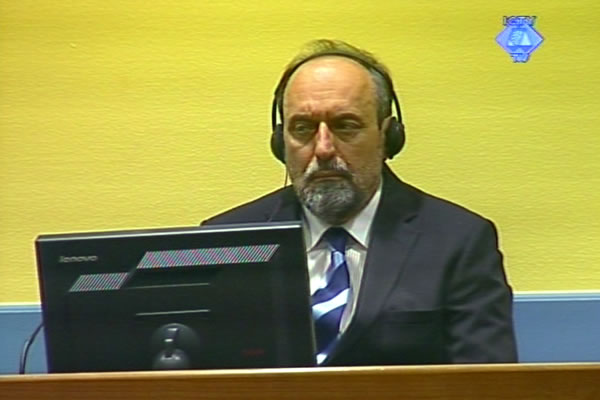Home
HADZIC HAS CASE TO ANSWER
Goran Hadzic’s motion to be acquitted at the half-time of the trial of the crimes in SAO Eastern Slavonia from June 1991 to the end of 1993 has been rejected. The date for the opening of the defense case will be communicated later
 Goran Hadzic in the courtroom
Goran Hadzic in the courtroom The Trial Chamber has denied the motion filed by Goran Hadzic’s defense to acquit the former prime minister of the SAO Eastern Slavonia at the half-time of the trial. In line with Rule 98 bis of the Tribunal’s Rules of Procedure and Evidence, on 16 December 2013 the defense petitioned the judges to drop the charges related to the crimes in Eastern Slavonia and in prison facilities in Serbia. According to the defense, the prosecution has failed to call sufficient evidence that would, if uncontested, lead to a conviction at the end of the trial. Two days later the prosecution urged the judges to deny the defense’s motion.
Invoking the ample jurisprudence on the application of this rule, the Trial Chamber noted that it could rule either on the dismissal of all counts or of whole counts in the indictment. Since the defense had asked the judges to dismiss only parts of some of the counts in the indictment, the Trial Chamber ruled that it couldn’t acquit the accused.
The judges also considered if the evidence on the specific crimes committed in Opatovac, Lovas, Velepromet and on Ovcara and Hadzic’s responsibility for them were sufficient to allow the Trial Chamber to convict the accused at the end of the trial.
First, the judges concluded that the crimes alleged in the indictment did happen at specified locations. The Trial Chamber then found that there was a joint criminal enterprise that involved several members including Slobodan Milosevic, Vojislav Seselj, Radovan Stojicic Badzo, Zeljko Raznatovic Arkan, Slavko Dokmanovic, Andrija Biorcevic and Mihalj Kertes. As alleged by the prosecution, the goal of the enterprise was to forcibly and permanently eliminate the majority of Croats and other non-Serbs from one third of the Croatian territory. Those areas were to become part of a new state under Serb dominance. The Trial Chamber found that enough evidence was called to show that Hadzic to a significant extent ‘contributed to the joint criminal enterprise and shared the intent of other members to implement its goal’.
Finally, the judges concluded that there was sufficient evidence for Hadzic’s criminal responsibility for the crimes in Lovas, Velepromet, Opatovac and Ovcara since he was a member of the joint criminal enterprise. The Trial Chamber emphasized that the existence of evidence leading to a conviction didn’t mean that Hadzic would be found guilty in the end of the trial.
Hadzic is charged with persecution, deportation, wanton destruction and looting of property, extermination, murder, detention, torture and cruel treatment of Croat and other non-Serbs detained in prison facilities on the Ovcara farm, in Velepromet in Vukovar, Erdut, Dalj, Borovo Selo and in facilities in Serbia: on farms in the villages of Stajicevo and Begejci, in the JNA military barracks in Zrenjanin and military prisons in Sid and Sremska Mitrovica.
Goran Hadzic’s trial began on 16 October 2012. The prosecution team headed by Douglas Stringer spent 180 out of a total of 185 allotted hours. Eighty-one prosecution witnesses were called, and more than 3,000 evidentiary exhibits were admitted into evidence. The defense was given the same amount of time for its case, slated to begin four months after the delivery of the Rule 98bis decision. The Trial Chamber will issue the scheduling order for the defense case later. The Chamber comprises Belgian judge Delvoie, presiding, and judges Burton Hall, of Bahamas, and Antoine Mindua, of Congo.
Linked Reports
- Case : Hadzic
- 2013-12-18 PROSECUTION: PLENTY OF EVIDENCE OF HADZIC’S GUILT
- 2013-12-16 DEFENSE: CHARGES AGAINST HADZIC NOT PROVEN
- 2013-10-18 PROSECUTION RESTS CASE AT HADZIC TRIAL
- 2014-04-08 HADZIC WAS CONSULTED ON EVERYTHING AND NOTHING
- 2014-04-09 HADZIC’S VISITS TO BELGRADE AND NOVI SAD
- 2014-06-17 GORAN HADZIC WILL TESTIFY FIRST IN HIS OWN DEFENSE
